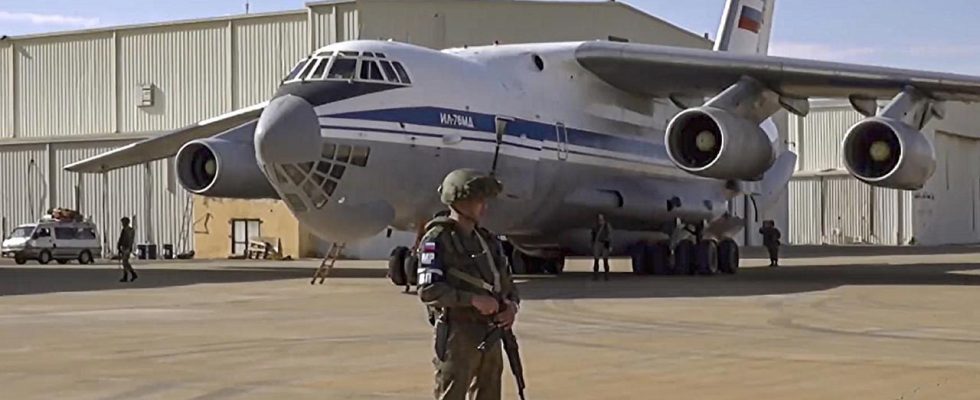The conflict in Sudan affects the interests of many foreign powers. It’s not just the neighboring states that are trying to exert influence. The USA, China and Russia are also players – with different goals.
general against general. The troops of military chief Abdel Fattah Al Burhan and the head of the paramilitary militia Rapid Support Forces (RSF), Mohammed Hamdan Daglo, known as Hemeti, have been fighting each other for around two weeks. Their power struggle threatens to destabilize the region, and foreign actors are also involved.
Western states are demanding peace negotiations and an end to the violence, and neighboring states from the Arab world are also trying to mediate.
Egypt’s interests
The most influential players in Sudan include the United Arab Emirates, Saudi Arabia and Egypt. As a directly neighboring country, Egypt relies on the water of the Nile to supply its more than 100 million inhabitants. Egypt also maintains close ties with the Sudanese military led by Al Burhan.
In addition to security of supply, the country is also concerned with its own internal security: around 20,000 Sudanese have crossed the border into Egypt in the past few days. “For Egypt, the most important thing now is that the instability in Sudan does not spread to and even exceed the country’s borders,” says Hager Ali, Sudan expert from the GIGA Institute.
Tactical considerations
The Arab Gulf states want to expand their power in the region. The United Arab Emirates, itself a burgeoning military power, has strong ties to the RSF. The Emirates are also the most important trading partner for imports and exports in Sudan. Ali believes that it remains to be seen whose side the Emirates are really on. “After this dispute within the country, things have to go on somehow. And you don’t want to gamble away the future economic and diplomatic relationship.”
According to the expert, the Emirates have long been interested in buying and controlling ports in the region. This was particularly promoted during the reign of the long-term Sudanese dictator Omar al-Bashir. “In addition, Sudan has attractive resources. Not just gold, but also natural gas deposits and agricultural land,” says Abdul Rahim of the Carnegie Center.
The Gulf States themselves have little usable land, which is why they will be interesting for the Gulf States in terms of food supply in the future.
The role of the Wagner group
Much has been written and speculated in recent days about Russia’s role in the conflict. Rahim thinks Russia’s influence in Sudan is generally overestimated. Russia is said to be supporting the RSF with probably 200 people from the Wagner group on site, but he sees it as a rather small force.
He doesn’t think “they have the guts to make another commitment. Anyone who gets involved will never get through it unscathed.” With its involvement in the gold business in Sudan, Russia is primarily pursuing commercial interests.
Ali also agrees: “Right now there are very, very few of the Wagner group in action. That’s why it’s important not to portray the role of the Wagner group as greater than it actually is.”
Rather, like other players, they would wait and see. “They want to see who emerges as the winner in the end and then play the political game and negotiate whatever interests they can get from the winner.” Although the Wagner Group is involved in gold mining, it is currently heavily involved in the war against Ukraine.
Russia wants a base
As early as al-Bashir’s time, Russia was planning to establish a naval base in Port Sudan on the Red Sea. After his fall in 2019, this effort was stopped by the Sudanese transitional government, to which both of today’s opponents belonged. However, relations between Russia and Hemeti continued. Russia is considered a supporter of the RSF military chief.
In return for being involved in the gold business, Russia is to support the RSF militia with weapons and ammunition, but also in defending against air raids and in training the fighters. Overall, the Wagner Group is trying to defend and uphold its own commercial interests in Sudan with the aim of increasing Russia’s influence in the region, Rahim said.
Does the RSF fail?
Rahim suspects that the military already has the upper hand and is likely to emerge victorious from the conflict. This is supported by the fact that the military air force can also fly air attacks. Important RSF supply lines around the capital have already been destroyed, and the RSF militia is slowly running out of supplies of food, ammunition and other fighters.
“I don’t think that the RSF will have a political future after this war and can continue to exist as a militia. The fighters will flee,” says Rahim.
A problem for the US
But other major global players are also watching the generals’ power struggle closely. So far, China has been an important partner for Sudan. With import and export business, but also with high investments in infrastructure, China has established itself as a new power and antithesis to the USA, while the USA had primarily invested in military aid and democracy promotion, according to Sudan expert Ali.
The USA, on the other hand, is threatened with a further loss of image, because the conflict shows that its military presence and development aid do not lead to democracy: “If Sudan now fails in this power struggle, then that will be a very big problem for the USA and also for its position of power in general Near East.”
The fighting in Sudan will continue for the time being – both experts believe that. Neither Hemeti nor Al Burhan have the political instruments to win the population over to their side and thus win the fight – because militarily and tactically there is no progress, says Ali.
She believes that peace negotiations are only possible with the participation of other actors. There is just a lack of insight on both sides.

